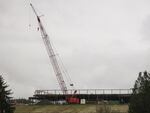
The $500 million Cowlitz tribal casino is under construction near La Center, Washington. The U.S. Court of Appeals for the District of Columbia will hear an appeal Friday about whether the project can continue.
Conrad Wilson / OPB
Construction on the Cowlitz Tribe's casino near La Center, Washington, is already well underway.
But the U.S. Court of Appeals for the District of Columbia is scheduled to hear a case Friday that could decide whether construction on the $500 million project must stop.
In a landscape made up of rolling hills and shades of green, the Costco-sized structure is already hard to miss. Dump trucks come and go from the site right off Interstate 5, just 15 minutes north of Portland. A large crane looms over carefully assembled steal beams that make up the casino’s walls.
“Construction’s going well. The weather has not impacted us and the steel is up and you’ll start to see the roof,” said Kara Fox-LaRose, the future casino's president and general manager.
Fox-LaRose works for the business arm of the Mohegan Tribe, which owns casinos in Connecticut and Pennsylvania. She said the Cowlitz casino will be a destination complete with views of the snow-capped Cascades.
“That will include 100,000 square fee of gaming space, which will be inclusive of 2,500 slots, 80 table games, 15 different restaurants, bars and retail outlets and a 2,500-seat meeting and entertainment venue,” Fox-LaRose said.
With all this construction and millions of dollars already spent, the Cowlitz and their investors are taking a gamble.
The U.S. Court of Appeals for the District of Columbia isn’t considering the question of the casino. Gerald Torres, a professor of Indian Law at Cornell Law School, said if the Cowlitz lose, it could jeopardize the tribe’s plans.
“They wouldn’t necessarily lose their land, but what they would lose is the trust status of the land,” he said. “If they lost the trust status of the land, then they would lose the ability to build a casino on the land.”
Back in 1934, Congress passed the Indian Reorganization Act. This case focuses on three words in that law.
“It’s complicated because what the term ‘under federal jurisdiction’ means is not by itself crystal clear,” Torres said.
The Supreme Court has ruled that the U.S. Department of Interior can take land into trust for tribes that were “under federal jurisdiction” as of 1934. But they haven't specified precisely what those three words mean.
The Cowlitz weren’t officially recognized by the federal government until 2002. But Justice Stephen Breyer issued a concurring opinion in a 2009 case that went a bit further. He wrote that “under federal jurisdiction” could, along with formal federal recognition, include less formal forms of acknowledgement, such as a treaty between a tribe and the government.
In December 2014, a U.S. District Court judge used that rationale to give the Cowlitz what they wanted: land in southwest Washington build a casino.
And it’s that decision that is being appealed.
“(The judge) felt that ‘under federal jurisdiction’ meant not necessarily federal recognition, but showing other indicia, such as relationships that you have with the federal government,” said Heidi McNeil Staudenmaier, who practices Native American and gaming law in Phoenix, Arizona.
“The Appeals Court may have a different interpretation,” she said. “Did the tribe have to be federally recognized as of 1934?”
The Confederated Tribes of Grand Ronde, the city of Vancouver and Clark County all oppose the Cowlitz casino.
For the Grand Ronde, it’s about competition. Local government leaders worry about taxes and traffic. Clark County is asking the appeals court to stop construction immediately.
But so far the backers of the Cowlitz casino seem unfazed by the appeal.
“Currently, there’s no impact to the project, this legal challenge we’re facing,” said Fox-LaRose, casino general manager. “We’re still scheduled to open. Our plan is to continue to move forward with construction scheduled to open next year.”
Given Clark County’s request to stop work, the Court of Appeals could rule within days. If not, a ruling could take months while construction on the casino continues.
